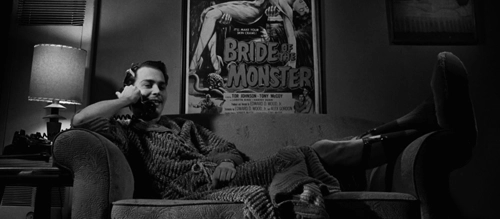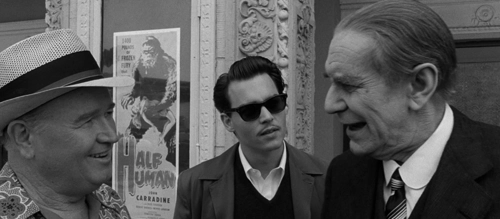
Ed Wood (1994)
Director: Tim Burton
Screenwriters: Scott Alexander, Larry Karaszewski
Starring: Johnny Depp, Martin Landau, Sarah Jessica Parker, Patricia Arquette, Jeffrey Jones, Bill Murray, G.D. Spradlin, Lisa Marie, Mike Starr, Max Casella, Brent Hinkley, Juliet Landau, George “The Animal” Steele, Ned Bellamy, Stanley DeSantis, Vincent D’Onofrio
Following the critical and box office successes of Beetlejuice, Edward Scissorhands and two Batman movies, goth auteur Tim Burton next collaborated with unorthodox biopic screenwriters Scott Alexander and Larry Karaszewski, and regular cinematographer Stefan Czapski, to tell the story of another industry outsider, one who never got his moment in the sun, Ed Wood. But 30 years on and after peaks and troughs in his own career, how does Burton’s affectionate tribute hold up?
In the early 1950s, enthusiastic but untalented filmmaker Edward D. Wood Jr (Johnny Depp) is struggling to be noticed in Hollywood. But his life and career changes when, in quick succession, he is hired to direct a sex change exploitation movie which he turns into a confessional about his own transvestism, and by chance he meets and befriends faded horror star Bela Lugosi (Martin Landau). We then follow the ups and downs – mostly downs – of the chaotic production of his three biggest movies, Glen or Glenda, Bride of the Monster and Plan 9 from Outer Space.
“For the first time, we are bringing you the full story of what happened. We are giving you all the evidence, based only on the secret testimonies of the miserable souls who survived this terrifying ordeal.”
We open with a more technically accomplished version of a classic Ed Wood-style scene, the camera tracking into a spooky house to TV psychic Crisswell (Jeffrey Jones) rising out of a coffin to deliver the above camp-ominous warning before proceeding through a gag-laden title sequence referencing all of Wood’s most infamous attempts at moviemaking.
Ed Wood is clearly a very personal film for Tim Burton, this despite the fact that the project didn’t originate with him. His affection for the director widely dubbed “the worst of all time” (incidentally a classic Burton outcast archetype) really shines through, and he actually ends up elevating the B-movie maker’s work by remaking some iconic schlock sequences in his inimitable style, but also by showing that what Wood may have lacked in talent he made up for in ambition, resilience and making do with the limited resources he had. Have no budget or technical expertise to execute the scale of your vision? No problem. Do it with stock footage. No convincing props available? No worries. Just raid the warehouse of the studio who mocked and turned you down.
“Nowadays no-one gives two fucks for Bela… I’m just an ex-boogie man.”
He may not be the titular character, but one of the main draws of Ed Wood is Martin Landau’s uncanny portrayal as a bitter, sweary, drug-addicted Bela Lugosi, “planning on dying soon” but tempted back to work by the enthusiastic Wood. They gave him some Oscar-winning Rick Baker prosthetic embellishment to better match the horror icon facially, but it’s all down to Landau’s also Oscar-winning careful, modulated and nuanced performance that gives the outmoded horror star such bite and a deep sadness.
Lugosi may be the showier role perhaps crying out for a biopic all to himself, but Johnny Depp still makes for a compelling lead, making Wood’s personality quirks and unconventional (for the 1950s) private life sweet and endearing but avoiding overplaying it to the point of parody. We are rooting for this Tinseltown underdog throughout the film; we see the crushing disappointment behind his fake smile as he is rejected time and time again by industry bigwigs and we desperately want him to succeed at something, anything.

“I don’t hire directors with burning desires to tell their stories. I make movies like Chain Girls. I need someone with experience of shooting a film in four days who’ll make me a profit,” so Ed is told by a sleazy producer (Mike Starr), but he isn’t one to let a rare opportunity pass him by. Ed sees the film that would become Glen or Glenda as far more than a sensationalist way to earn a quick buck. In fact, he wants to use it to preach tolerance to the world towards anyone who doesn’t nearly fit into perceived gender norms. What with Ed’s love of his wife Dolores’s (Sarah Jessica Parker) cashmere sweaters and Bill Murray playing flamboyant actor-socialite Bunny Breckinridge preparing to travel to Mexico to begin gender reassignment, there’s enough here to aggravate all the worst people on the internet, even if it’s not exactly a nuanced take on the subject of gender identity.
This is a film full of in-jokes about the business of Hollywood and the shortcuts and compromises artists often have to take to get projects off the ground. Lugosi derides 50s horror movies for being inferior and frequently featuring giant insects, Ed and his entourage have to break off filming mid-scene to degradingly beg for the funding to get a film over the line, and even Orson Welles bemoans the fact that an artist of his calibre is “supposed to do a thriller for Universal but they want Charlton Heston to play a Mexican”. There’s also a brilliant gag with wannabe star Loretta King (Juliet Landau) struggling to choose between a green and a red dress, which we can’t see because the movie’s in black and white, the cameraman can’t see because he’s colourblind, and the in-universe audience won’t be able to see either because the movie being made will also be in black and white.
Of course some of the more memorable scenes in this never actually happened – Ed didn’t meet Bela shopping for coffins and his hero Orson Welles never gave him a timely pep talk about artists standing up to money men. But Lugosi was really burred in his Dracula cape and Wood and his cronies were widely rumoured to have stolen a giant octopus prop from a studio warehouse in the dead of night, because how else does did the creature, far more expensive than anything he could have afforded on his budget, appear to unconvincingly eat Bela Lugosi in the finale of Bride of the Monster?
You have to question whether the film goes easy on a filmmaker whose uninspiring body of work has largely survived to the present day as “Exhibit A” in the Ed-Wood-was-a-terrible-director argument. Burton, Depp and many other famous film fans like John Waters have expressed their unironic love of Wood’s earnest effort paired with artistic ineptitude and it is through this prism that his life story is largely viewed. The darker aspects of Wood’s personality are not touched upon and his stubborn refusal to do multiple takes of scenes where something had clearly gone wrong is without exception presented as charming rather than exasperating.
Burton’s love letter to the critically-despised, cult favourite director of Plan 9 from Outer Space is well performed, beautifully filmed, frequently funny and sometimes moving. Ed Wood isn’t a particularly deep examination of an eccentric Hollywood reject and it doesn’t erroneously claim Ed Wood was some kind of a misunderstood genius, but there are plenty of ways to enjoy his work today and to appreciate the impact he had on audiences even if his industry never accepted him no matter how hard he tried to be loved during his lifetime.
Score: 20/24
Recommended for you: Tim Burton Movies Ranked

